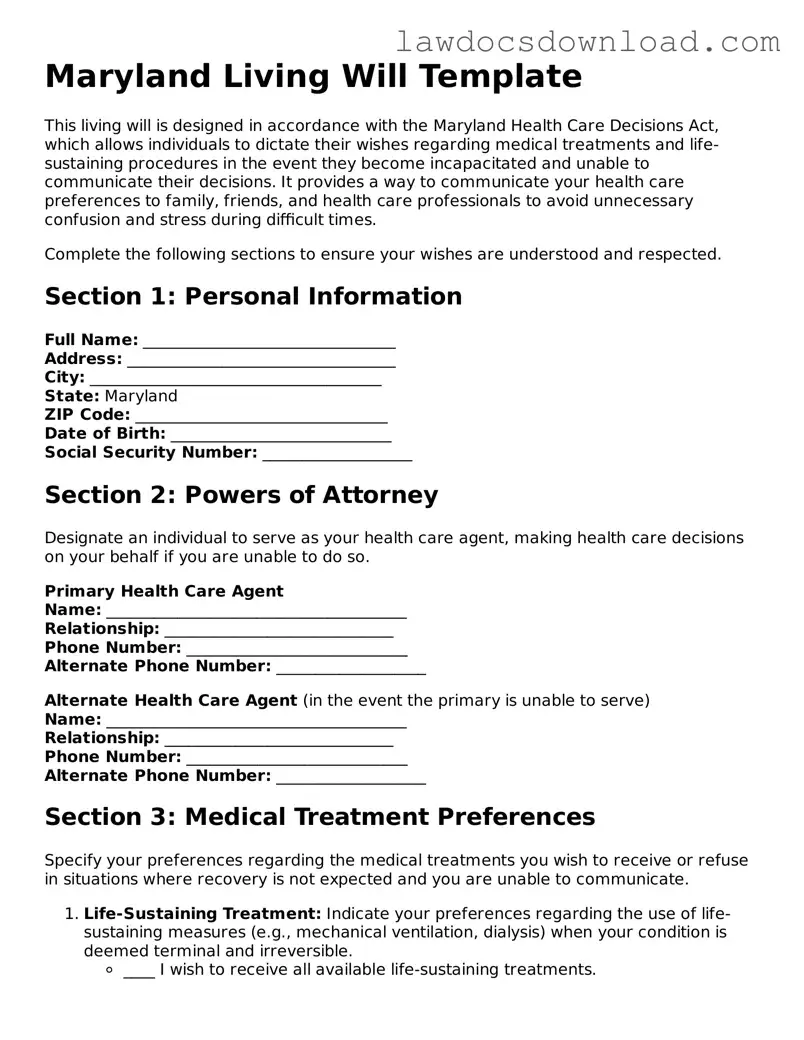Maryland Living Will Template
This living will is designed in accordance with the Maryland Health Care Decisions Act, which allows individuals to dictate their wishes regarding medical treatments and life-sustaining procedures in the event they become incapacitated and unable to communicate their decisions. It provides a way to communicate your health care preferences to family, friends, and health care professionals to avoid unnecessary confusion and stress during difficult times.
Complete the following sections to ensure your wishes are understood and respected.
Section 1: Personal Information
Full Name: ________________________________
Address: __________________________________
City: _____________________________________
State: Maryland
ZIP Code: ________________________________
Date of Birth: ____________________________
Social Security Number: ___________________
Section 2: Powers of Attorney
Designate an individual to serve as your health care agent, making health care decisions on your behalf if you are unable to do so.
Primary Health Care Agent
Name: ______________________________________
Relationship: _____________________________
Phone Number: ____________________________
Alternate Phone Number: ___________________
Alternate Health Care Agent (in the event the primary is unable to serve)
Name: ______________________________________
Relationship: _____________________________
Phone Number: ____________________________
Alternate Phone Number: ___________________
Section 3: Medical Treatment Preferences
Specify your preferences regarding the medical treatments you wish to receive or refuse in situations where recovery is not expected and you are unable to communicate.
- Life-Sustaining Treatment: Indicate your preferences regarding the use of life-sustaining measures (e.g., mechanical ventilation, dialysis) when your condition is deemed terminal and irreversible.
- ____ I wish to receive all available life-sustaining treatments.
- ____ I do not want any life-sustaining treatments and prefer to allow natural death.
- Artificial Nutrition and Hydration: State your wishes regarding the use of feeding tubes or IV fluids to keep you alive in terminal conditions.
- ____ I wish to receive artificial nutrition and hydration under any circumstances.
- ____ I do not want artificial nutrition and hydration if my condition is terminal and irreversible.
- Pain Management and Comfort Care: Express your desires concerning pain relief and comfort measures, even if these treatments may hasten death.
- ____ I wish to receive medication to relieve pain and discomfort, even if it shortens my life.
- ____ I wish to be kept comfortable, but do not want treatments that might significantly shorten my life.
Section 4: Signature and Witnesses
To validate this living will, your signature, along with the signatures of two witnesses or a notary public, is required. Witnesses must not be related to you by blood or marriage, entitled to any part of your estate, or responsible for your health care costs.
Your Signature: ____________________________ Date: _______________
Witness 1 Signature: ____________________________ Date: _______________
Witness 2 Signature: ____________________________ Date: _______________
Please review your living will regularly and update it as needed to reflect your current wishes.

